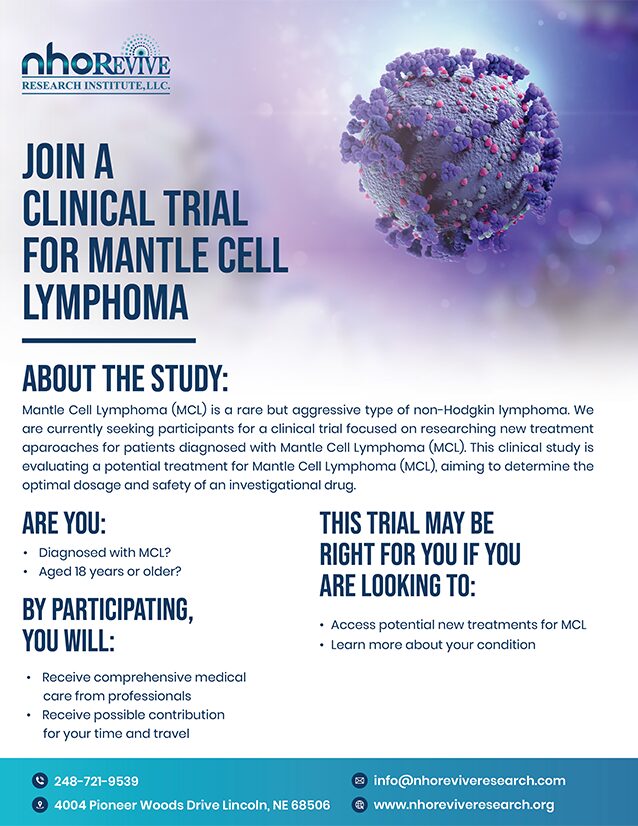NHO-Revive is committed to advancing Mantle Cell Lymphoma research studies through cutting-edge MCL clinical trials in Nebraska.
Mantle Cell Lymphoma Clinical Trials in Nebraska
Understanding Mantle Cell Lymphoma and Its Complications
Mantle Cell Lymphoma (MCL) is a rare but aggressive type of blood cancer that originates in the mantle zone lymphocytes within the lymph nodes. While current treatments can slow progression, research continues to improve outcomes. Mantle Cell Lymphoma Clinical Trials in Nebraska are investigating innovative therapies that may enhance survival and quality of life.
Potential Treatment for Mantle Cell Lymphoma
Ongoing research focuses on targeted therapies, immunotherapy, and novel drug combinations. MCL clinical trials in Nebraska provide access to these cutting-edge treatments, helping patients explore new options beyond standard care.
You may be eligible for MCL Clinical Trials if you
- Have been diagnosed with Mantle Cell Lymphoma
- Have relapsed or refractory MCL
- Have not responded to standard treatments
- Meet specific eligibility criteria for clinical research
*Participating in Mantle Cell Lymphoma research studies can provide early access to innovative therapies while contributing to the advancement of MCL treatments.
Exploring and Learning About Mantle Cell Lymphoma
At NHO-Revive, we are dedicated to improving the lives of patients with Mantle Cell Lymphoma. Our research focuses on exploring potential treatments for Mantle Cell Lymphoma that may lead to better outcomes. Clinical trials play a crucial role in this mission by testing the latest advancements in cancer treatment.
If you or a loved one has been diagnosed with Mantle Cell Lymphoma, participating in an MCL clinical trial in Nebraska may provide access to promising therapies. Every study is carefully designed to evaluate new approaches, ensuring patient safety while advancing medical science.
By joining an MCL research study, you become part of a dedicated effort to improve the future of Mantle Cell Lymphoma treatment.
What to Expect
Joining a Mantle Cell Lymphoma clinical trial is a significant decision. Here’s what you need to know:
- Eligibility Review – A medical team will assess whether you qualify for a study.
- Treatment Plan – If eligible, you’ll receive study-related treatment, closely monitored by specialists.
- Regular Monitoring – Your progress will be evaluated to ensure safety and effectiveness.
- Supportive Care – Our team is committed to providing personalized guidance throughout the trial.
Age
18 Year and Older
Gender
Male and Female
Location
Nebraska

300
Advancing Treatment for Mantle Cell Lymphoma
This clinical study is evaluating a potential treatment for Mantle Cell Lymphoma (MCL). The study aims to determine the optimal dosage and safety of this investigational drug.
The study has two main phases:
- Phase 1: Focuses on finding the best dose of the study drug through dose escalation and safety evaluation.
- Phase 2: Expands on the selected doses to further assess effectiveness in patients with Mantle Cell Lymphoma.
By participating, patients may gain early access to an innovative treatment while contributing to Mantle Cell Lymphoma research studies. If you have MCL and are seeking new treatment options, this trial may be an opportunity to explore potential treatments for Mantle Cell Lymphoma.
Frequently Asked Questions
Interested in learning more about our research? Explore our frequently asked questions to gain knowledge about this condition.
What is the survival rate of mantle cell lymphoma?
The survival rate for mantle cell lymphoma (MCL) varies depending on factors such as the stage of the disease, overall health, and response to treatment. The median overall survival is typically 5-7 years, though newer treatments and clinical trials are improving outcomes.
What happens if I’m chosen to participate in MCL clinical trial?
When chosen to participate in a Mantle Cell Lymphoma clinical trial, you will go through several steps. First, you’ll undergo tests to confirm your eligibility. Once enrolled, you’ll need to review and sign a consent form to proceed.
How is mantle cell lymphoma diagnosed?
Mantle cell lymphoma (MCL) is typically diagnosed through a combination of tests. These include a biopsy of the lymph nodes or other affected tissues, blood tests, imaging scans like CT or PET scans, and bone marrow biopsies. Specialized tests, such as immunophenotyping and genetic analysis, may also be performed to identify specific markers of MCL.
Are there any risks involved in mantle cell lymphoma clinical trials?
Clinical trial carry potential risks which may include side effects from the study drugs. However, being under the care of expert physicians helps mitigate these risks.
What is the Potential Treatment for mantle cell lymphoma?
Potential treatments for MCL include chemotherapy, immunotherapy, targeted therapy, stem cell transplants, and investigational drugs. Clinical trials may offer access to new therapies, such as targeted drugs, designed to improve outcomes by focusing on specific aspects of the disease.





